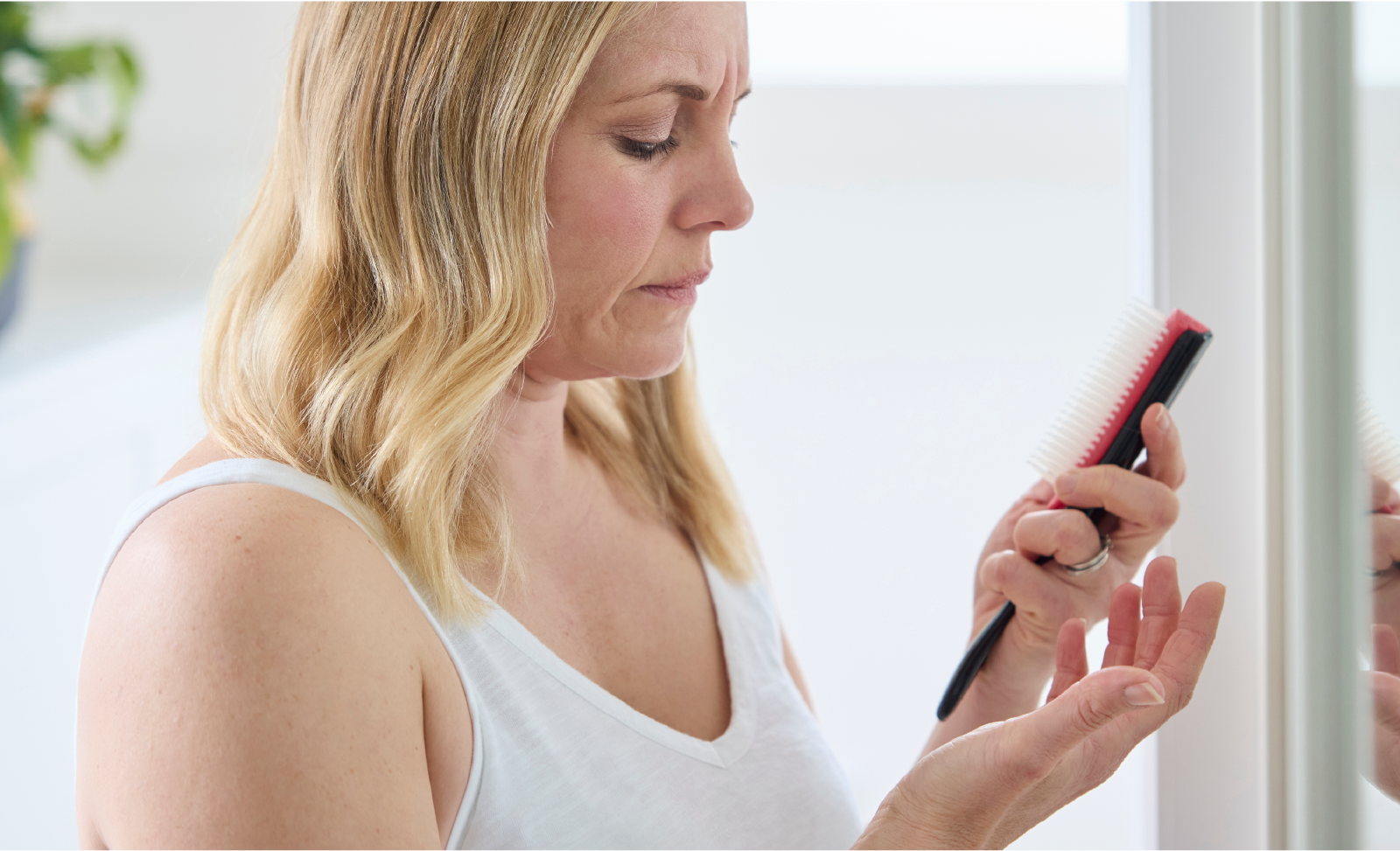Hair loss is a challenging experience for many people. The hair on our head is an extension of who we are, and it can play a defining role in our look, style, and personality. So when those hair follicle numbers begin to drop, it’s not uncommon for it to have a detrimental psychological impact.
It may seem like an exaggeration, but for some, dealing with hair loss is akin to losing someone close to you. While certain people can accept the situation, others are left with a huge psychological scar – and it needs addressing before further damage is done.
That’s where this well-being guide can help. We take a closer look at hair loss, and understand why it happens, the people it affects, and the negative influence it can have on mental health. This is then followed by ways to overcome the emotional damage, including coping techniques and available support channels.
What Causes Hair Loss?
Hair loss is normal. Between 50 and 100 hairs typically depart from the scalp each day, often without anyone noticing. You may see the odd loose hair when showering or using a brush, but it’s usually not a cause for concern. After all, the average person’s scalp contains around 100,000 hairs.
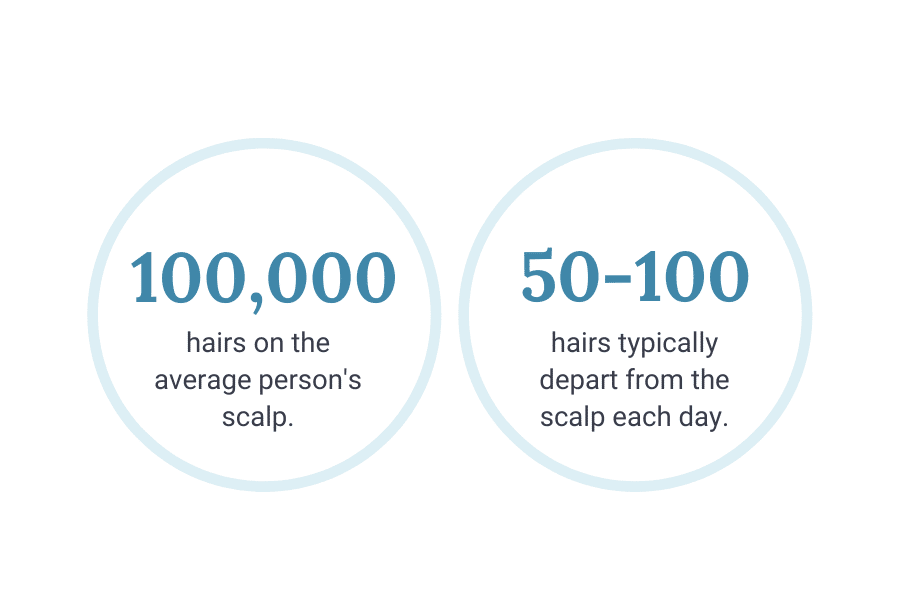
The worries begin to mount when hair starts falling out in larger amounts than usual. With each clump of hair, the distress levels go up as you realise you might be in the same situation that 20% of men experience by age 20: significant hair loss.
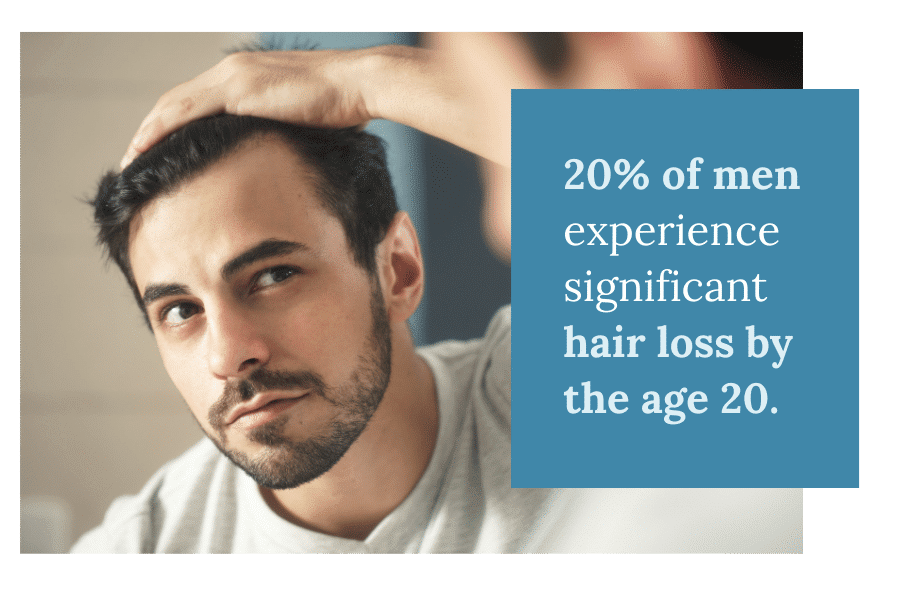
There are numerous factors that can influence hair loss. Certain causes only lead to temporary hair loss, while others are permanent. Below we take a look at some of the main reasons behind hair loss.
Androgenetic alopecia
Androgenetic alopecia is the most common reason behind hair loss. It is another name for male or female pattern baldness.
Androgenetic alopecia is genetic, which means it can happen to anyone with a family history of hair loss. For males, hair loss tends to create a visible receding hairline around the temples and a bald spot on the crown of the head. For females, it’s not usually patches of hair that are lost like males, but generally a thinning of the entire head of hair.
Androgenetic alopecia can strike at any stage following puberty. However, it’s more likely to occur as an individual ages. For those that experience female pattern baldness, many cases are a result of going through the menopause.
Telogen effluvium
A condition that causes hair to remain in the natural shedding (telogen) stage of the hair cycle, telogen effluvium can lead to significant hair loss. It’s not uncommon for hair to come out in clumps and handfuls.
Possible causes for telogen effluvium include severe stress, rapid weight loss, surgery, and thyroid problems. In usual cases, this condition is temporary and resolves with time.
Anagen effluvium
During the growth (anagen) stage of the hair cycle, significant amounts of hair rapidly fall out due to anagen effluvium. Along with hair from the scalp, it can lead to loss from other areas of the body, including eyelashes and eyebrows.
Anagen effluvium causes include chemotherapy, fungal infections, and radiation. For those undergoing chemotherapy, hair will generally grow back once treatment is stopped. This can take up to six months before results show.
Pregnancy
A drop in estrogen levels can lead to significant hair loss. This is evidenced by those who are pregnant. Shortly after giving birth, estrogen levels can decrease, and it’s not wholly uncommon for women to suffer from excessive hair loss.
This hair loss type is only a temporary condition. The issue usually resolves naturally within a year.
Other causes
Due to hair follicles being attacked by the immune system, alopecia areata is another condition that leads to sudden hair loss. Traction alopecia, where hair is pulled into tight hairstyles – including cornrows and tight ponytails – leads to breakages and potentially permanent damage.
Other causes of hair loss are nutritional deficiencies, certain medications, birth control pills, and ringworm.
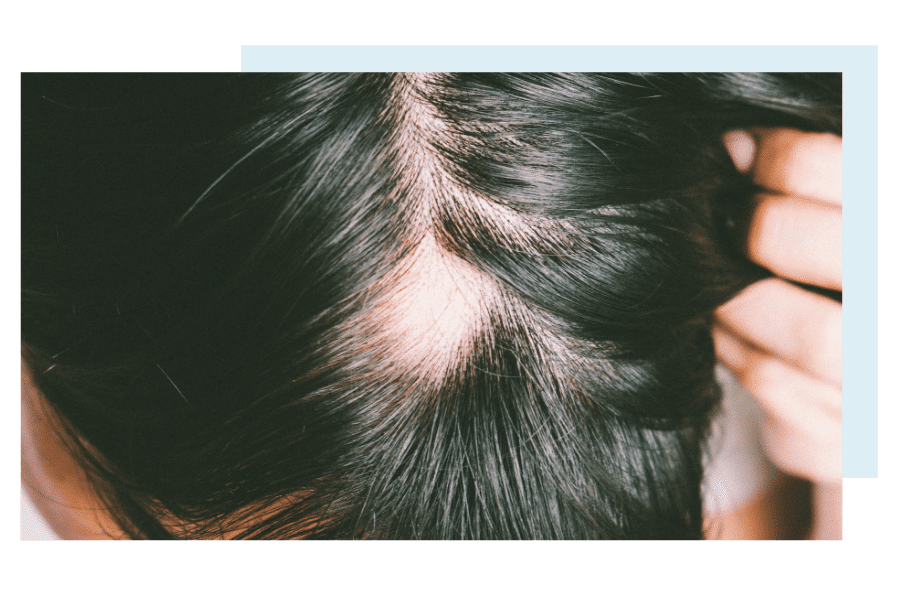
How Many People Experience Hair Loss?
Excessive hair loss is a common issue. The number of TV adverts for hair loss treatments is evidence of the situation. Yet just how prevalent is hair loss? Below we take a closer look at how it can affect men, women, and trans people.
Hair loss in men
When people think about hair loss, it is generally associated with the male population. There are various reasons why this is the case. One reason is that hair loss usually strikes at an earlier age for men in comparison to women. Secondly, male hair loss tends to be more visible. Receding hairlines and bald spots are difficult to cover up, and the hair loss can continue to be more visible as time goes on.
As for the widespread nature of hair loss in men, research from Bosley reveals the percentage of men displaying noticeable hair loss in certain age groups:
- Age 20: 20% noticeable hair loss
- Age 30: 25% noticeable hair loss
- Age 50: 50% noticeable hair loss
- Age 60: 66% noticeable hair loss
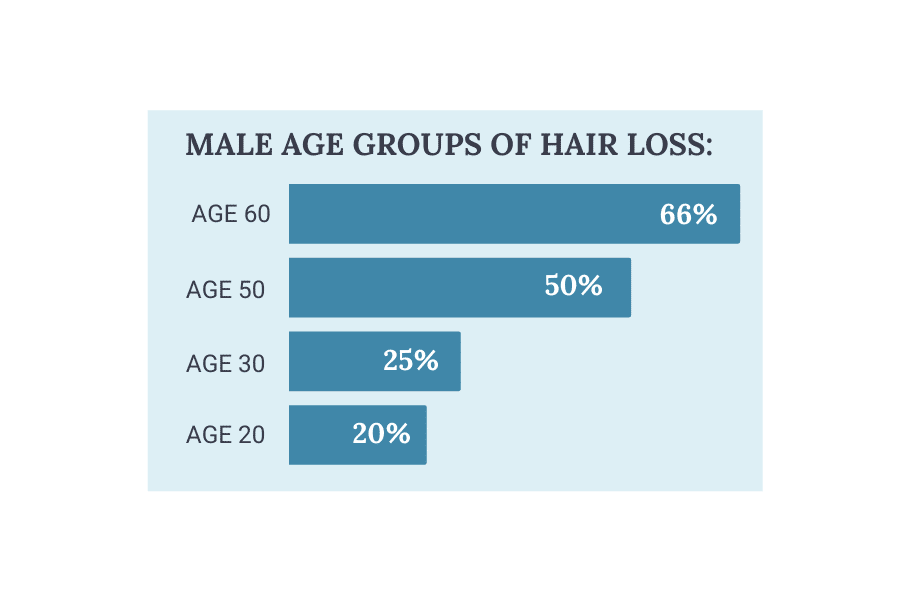
This stat shows that, by the age of 30, a quarter of the male population will have to deal with a significant amount of hair loss.
While uncommon, there are situations where male teenagers as young as 15 and 16 experience hair loss. Coping with hair loss at a young age, even if it’s just thinning or minimal receding, can be especially difficult.
Hair loss in women
It might not receive as much coverage as male hair loss, but a lot of women also have to deal with the emotional struggle of this physical issue. In fact, in the UK alone, recent estimates suggest as many as 8 million women suffer from hair loss. On top of this, for women aged 70 and over, 40% experience female pattern baldness.
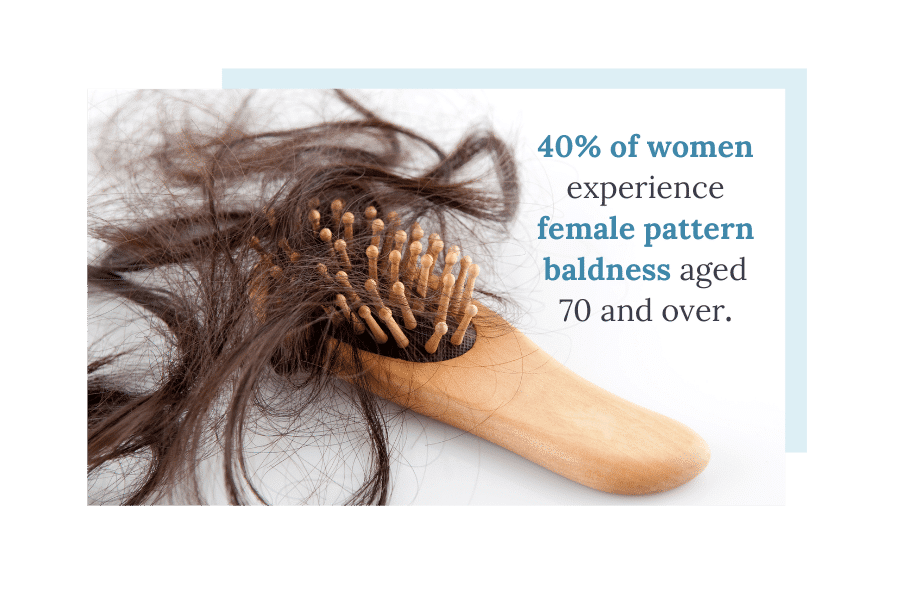
Even though the impact of hair loss is often not as visible as male sufferers, females can still experience the same – or even greater – psychological distress. Male hair loss is not a great surprise, and while there’s a stigma attached to it, it is more accepted in general society. On top of that, a shaved head can project masculinity and strength, while hair loss in men can be judged as a sign of virility. However, for women, particularly younger ones, there’s a strong social stigma that comes along with hair loss. The general perception is that a woman’s hair should be thick, luxurious, and stylish. As a result, it only takes the hair to thin for it to cause psychological pain, where women feel ashamed, embarrassed, and hopeless by the situation.
Hair loss in trans people
“When you take your wig off at the end of the day and you look in the mirror, and you’re like, ‘I look like a man because I have a man’s hairline.’ It’s such a big signifier of maleness. – Source
Hair loss can affect both transgender women and men. Due to androgenetic alopecia, this is particularly impactful for trans women. They want a thick, luscious head of hair – not one that displays bald spots and a receding hairline. This type of hair loss can be seriously detrimental to their identity and feeling of belonging.
Even though the damage naturally isn’t as noticeable for trans men, hair loss is still an issue that some trans men have to deal with over time. While some trans men welcome scalp hair loss, that isn’t the situation for everyone. The hair loss isn’t necessarily down to just genetics, either. On the X chromosome, there are at least 40 points that influence hair loss. Due to taking testosterone as part of their transition, it’s more likely for trans men to suffer from androgen-induced hair loss.
How Hair Loss Can Impact Us Emotionally
“It was devastating when it first started. And when I first lost it all four years ago, I cried a lot. [ …] And it took me about two years [to recover emotionally]. I really – I really had to mourn the loss of my hair.” – Source: SpringerOpen
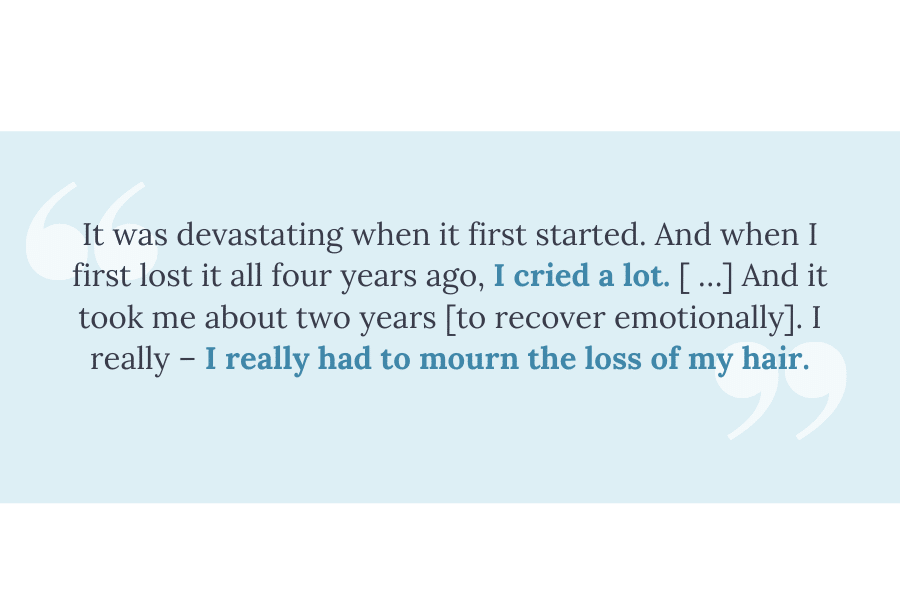
Coping with hair loss is a difficult situation for many. This extends to being emotionally detrimental in various different ways. Hair loss might result in anxiety, social phobia, and depression.
When it comes to the most important feature in terms of physical attractiveness, both men and women place hair towards the top of the list. Because of this, if the appearance of their hair is negatively affected, the psychological impact of hair loss can be drastic.
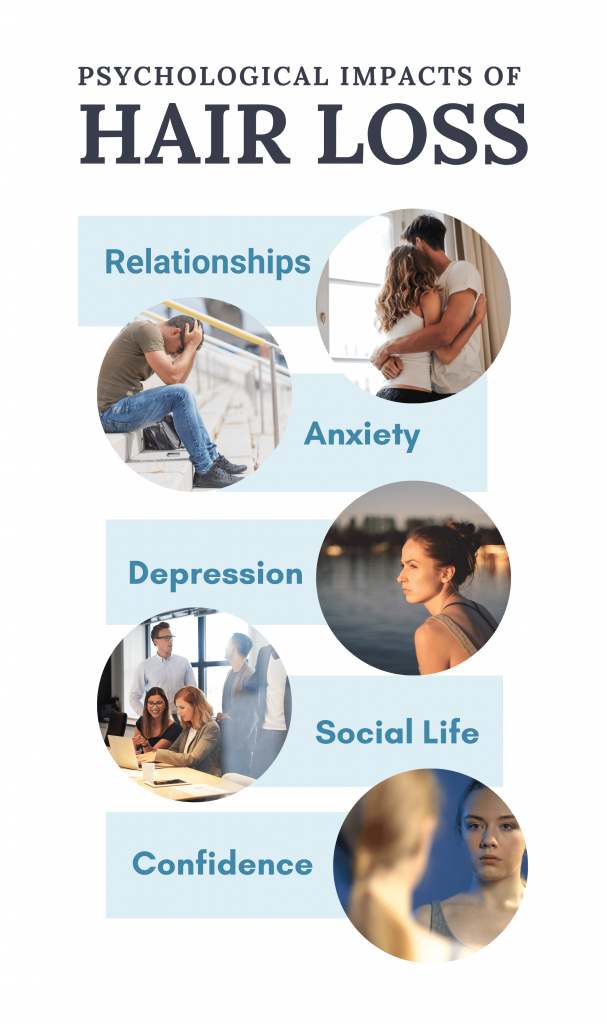
Hair loss and depression
“You kind of accept it. This is the way it’s supposed to be. And you just keep on aging. Your hairline keeps adding like ten years to you, so you feel older and older. Then you just think, ‘I’ll just shave all my hair off.’ That’s the only option. There’s no other solution. Then no one will actually know that you have a receeding hairline because you have no hair.” – Source (Jonathan Saccone video)
Depression is an understandable consequence of hair loss. Research notes that, due to the change in appearance caused by hair loss, people can feel insecure, self-conscious, and inadequate – and this can negatively impact their entire identity.
Stressful experiences can further proliferate the symptoms of hair loss and, by extension, distress and depression. Compared to those who don’t deal with high-stress levels, it is said women are 11 times more likely to suffer from hair loss if they deal with high levels of stress.
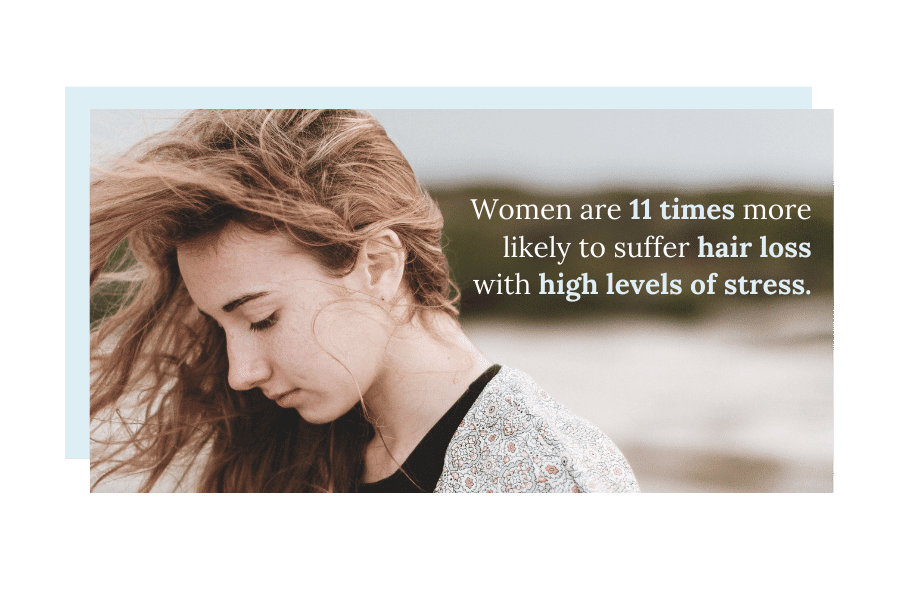
There’s also a real possibility that hair loss can be damaging to personal relationships, which again opens the door to depression rearing its ugly head. Research notes around 40% of women have endured marital problems due to their alopecia. Just as worryingly, 63% also state their alopecia has caused career-related issues.
Depression is also a double-edged sword with hair loss. The reason: those suffering from depression can experience further hair loss symptoms. Depression can result in physiological states like low self-esteem, discouragement, low mood, and the feeling of being drained. These factors can cause hair to become brittle and dry, and it’s liable to break as a result.
If anti-depressant medication is used – such as Prozac – this can also lead to side effects that promote hair loss.
Hair loss and anxiety
“I think for everyone that loses their hair it’s a stressful time. I think anyone that says it isn’t is lying.” – Source
The impact of hair loss is also something that can lead to feelings of anxiety. When people are not confident in their appearance, this can lead to significant stress and anxiety in situations that are perceived as normal. They can struggle to have their photo taken, for instance, and even leaving their home can be difficult.
This can have a snowball effect on their personal life. Those dealing with anxiety might struggle with relationships, their career, and having a healthy social life. The snowball effect continues as these aspects can usher in depressive thoughts, leading to further damage caused by hair loss.
Unlike depression, it is very rare for anxiety to be a direct cause of hair loss. However, anxiety may lead to a habitual condition known as trichotillomania. This condition triggers them to pull out their hair without realising their actions. By doing this, it can lead to further hair loss with large clumps being forcibly removed.
Those trying to cope with alopecia are more likely to suffer from psychiatric disorders than the general population. As well as serious depressive episodes and anxiety disorders, this means they’re at a higher risk of developing a paranoid disorder or social phobia.
Support Available
“I think when you first see someone it’s their hair, at least for me, like the hair is everything.” – Source: SpringerOpen
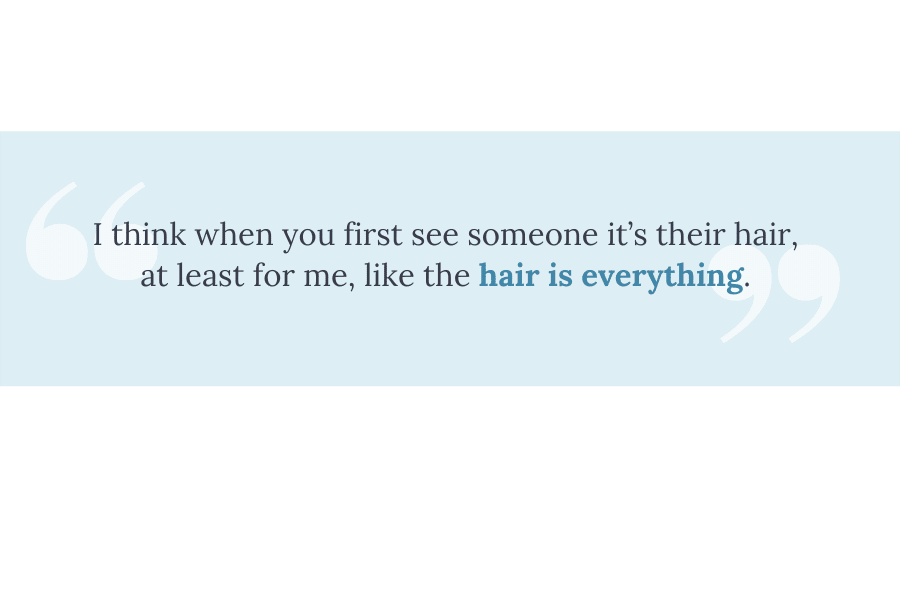
You know how hair loss occurs. You know the potential hair loss impact. The good news is there are various support channels available. From treatments to discussion forums, you’re not alone in your mental battle against hair loss.

Forums
Many hair loss sufferers have found themselves in a situation where they experienced or perceived negative judgement from others. With this in mind, it’s a wise idea to join others in the same position, where you can healthily discuss the issues faced due to hair loss.
An impact of hair loss forum is a great way to connect with others going through the same situation. You can discuss your experiences, read stories from other users, and receive honest insights and feedback when requested. It’s also possible to receive helpful advice about how to cope with mental health issues like depression and anxiety.
Hair loss forums are also particularly useful for learning about hair treatment options. Not only can you read about a user’s experience with a particular hair treatment, but many will also supply before and after photos for you to see first-hand evidence of the treatment’s overall effectiveness.
For forum recommendations, consider the following choices for learning about coping with hair loss:
Charities
Whether you have suffered hair loss due to alopecia or cancer treatments, there are charities available to provide support. Below are some of the options available in the UK:
- Alopecia UK: This charity is dedicated to helping those affected by alopecia. Their services include sourcing wig providers to offering various online support channels.
- Cancer Hair Care: The leading hair loss support charity in the UK, Cancer Hair Care provides free support packs, advice, and support.
- My New Hair: My New Hair is supported by salons that create wigs for those suffering from hair loss.
The support available from charities like these cannot be understated. It’s their mission to help those dealing with hair loss, so they will be able to advise and provide services to make life that little bit easier.
Treatments
“I was quite young when I had [my hair transplant] but I felt like I had no other choice. I don’t have an issue with being, you know, bald when I’m 30 or having hair loss then, but, you know, I was going to uni and stuff. I didn’t really want to have to deal with all of this at such a young age… Having that confidence back is honestly a game changer for me because I feel like I can just do anything.” – Source
According to research, some patients were frustrated or angry due to the lack of treatment availability and public understanding of hair loss. Nevertheless, there are numerous treatment routes you can take with hair loss – although this is dependent on various factors.
For instance, if your hair hasn’t regressed too much, using medication like minoxidil and finasteride can help with regrowing hair. Although if you decide to go down this path, keep in mind you have to keep taking this medication; otherwise, the regrown hair will depart again – and you’ll be left back where you started.
For impressive, long-lasting results, we’d be remiss if we did not mention hair transplants as a treatment solution. While transplants only work best for certain individuals where hair loss has stabilised, modern treatments have taken this procedure to new heights. This is often a recommended treatment solution for those able to afford it.
Scalp micropigmentation – aka hair tattoos – are growing in popularity. While they won’t solve hair loss and you only have one hairstyle type, they are effective in creating a realistic appearance that disguises thinning hair for both men and women.
When it comes to how to cope with hair loss as a woman, one of the most affordable – and effective – choices is wigs and extensions. The latter is particularly beneficial for adding volume to thinning hair.

Coping Techniques
If you’re wondering how to deal with hair loss mentally, coping techniques are a useful way to suppress mental anguish. One technique is to join a support group. Much like a forum, you can join individuals in the same boat – except this time, you can meet face-to-face and socialise.
Extending on from that point, think about discussing your hair loss with loved ones. Let them know your feelings and the support you’d like to receive from them.
Another coping technique can be to cover up your hair. Wigs, scarves, hats, make-up – there are ways to go about your day without publicly displaying your hair loss. Find the right disguising product, and you can feel more comfortable around others.

